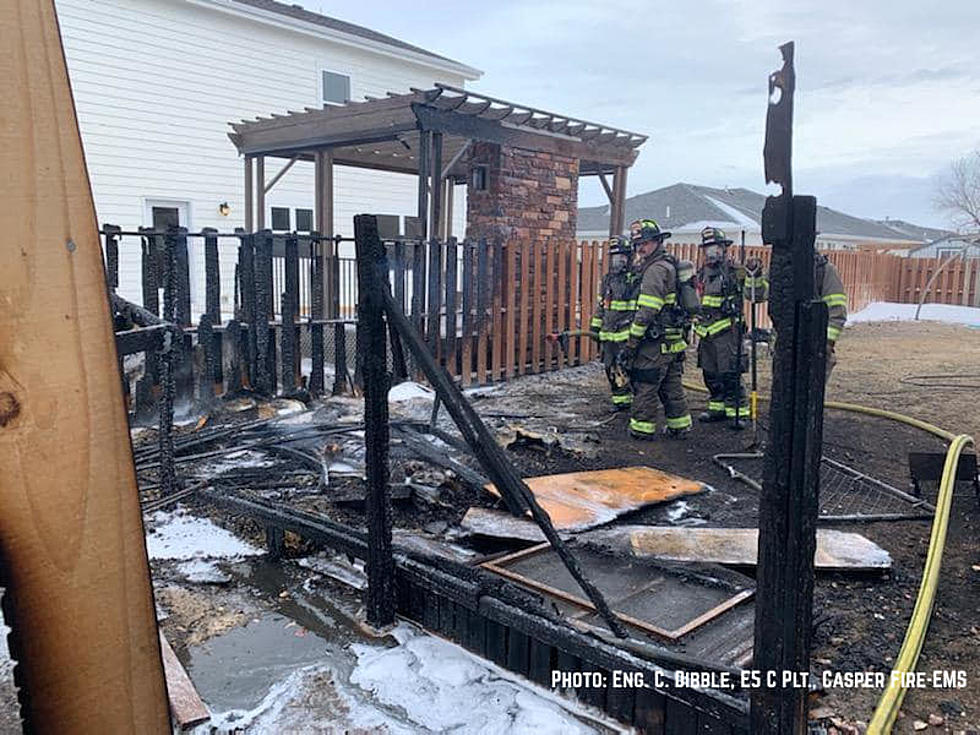![Wyoming, Montana Coal Miners Sent Home Amid Regulatory Dispute [UPDATED]](https://townsquare.media/site/101/files/2016/05/4954539691-e1483493007177.jpg?w=980&q=75)
Wyoming, Montana Coal Miners Sent Home Amid Regulatory Dispute [UPDATED]
UPDATE (12:40 p.m.)
Rebecca Harbage, public policy director for the Montana Department of Environmental Quality, says regulators are working to reach an agreement with the new ownership of Montana's largest coal mine and get miners back to work.
"We would like to get this resolved as timely as possible," Harbage told K2 Radio News in a phone interview Thursday. The parties were working toward a resolution in an ongoing meeting shortly after 12 p.m., she added.
Most of the Spring Creek miners were sent home Thursday morning after the DEQ declined to issue a permit allowing mining operations to continue under the Navajo Transitional Energy Company. Wholly owned but not controlled by the Navajo Tribe, the company finalized its acquisition of the mine -- as well as the Cordero Rojo and Spring Creek mines in Wyoming -- Wednesday.
The company and DEQ have not yet reached an agreement as to the company's waiver of sovereign immunity, which Harbage explained is necessary before a permit can be issued.
Harbage said recent talks with the Navajo Transitional Energy Company have been promising, and an agreement seems likely.
Because the company is an entity of the Navajo Tribe, sovereign immunity would prevent any state action against the company in Montana courts. Harbage said the state needs to be able to enforce its laws and regulations, particularly with regard to reclamation bonding, against all coal operators in Montana.
A waiver of sovereign immunity would allow court action against the company. Harbage said a waiver must be granted before the company would be permitted to resume mining.
Spokesman Erny Zah said earlier Thursday that Navajo Transitional Energy Company had already agreed to a partial waiver. However, Zah claimed, the state responded that a partial waiver would be inadequate, and demanded a full waiver.
"We are shocked and disappointed that the State is taking this position and putting the future of Spring Creek at risk," company chairman Tim McLaughlin said Thursday. "We have done everything in our power to ensure the State that we will operate under their laws, but we simply cannot consent to a full waiver of the rights preserved in our Treaties -- to do so would put the foundation of Indian Country at great risk."
Harbage claimed the Montana DEQ has not demanded a full waiver from the company. She says a permit has not been issued because the company only recently responded to a weeks-old notification that a waiver would be required.
Harbage said DEQ notified the company of the need for a waiver Oct. 7 and followed up a week later on Oct. 15. The company only responded Monday, Harbage said. Although negotiations seem to be headed in the right direction for the issuance of a permit, an agreement wasn't reached before the company formally acquired the mine Wednesday, and thus operations had to be suspended Thursday morning.
Before the company responded Monday and began negotiating a compromise, Harbage added, the company had claimed it would be able to operate the mine under an existing buyer-seller agreement. Harbage said such an agreement, to which the DEQ is not a party, would be insufficient.
It is a unique issue that Harbage has not encountered before any permitting process, she said.
=============================================================
Original Story:
Wyoming and Montana coal miners were sent home from work at the Spring Creek Mine on Thursday amid a conflict between state regulators and the mine's new owners.
The Montana Department of Environmental Quality reportedly refuses to issue an operating permit to Farmington, New Mexico-based Navajo Transitional Energy Company, which is wholly owned by the Navajo Tribe. The denial of the permit, the company said in a statement, is in response to the company's refusal to completely waive its sovereign immunity.
"[The company] has agreed to a partial waiver, allowing the company to be regulated by Montana under any and all state laws," spokesman Erny Zah said. "Despite months of productive conversations with Montana DEQ, last week, the agency demanded a full and complete waiver of sovereign immunity from [the company]."
Zah said that earlier this week, Carlson Goes Ahead, who is vice chairman of the Crow Tribe, wrote a letter to Montana Gov. Steve Bullock requesting that "...the State of Montana maintain consistency in its relations amongst tribes and extend NTEC the same comity and respect it has shown to tribal nations located within the state."
The company took possession of the Montana mine, as well as the Cordero Rojo and Antelope mines in Wyoming, on Wednesday. Former owner Cloud Peak Energy was forced to sell its assets after declaring bankruptcy.
The transition at the Wyoming mines, the company said, has been seamless.
Sheridan resident Misty Wisenbaker told K2 Radio News that her husband Preston, who has worked at the mine for roughly three years, was sent home following a routing meeting Thursday morning. She said if the dispute has not been resolved by Monday, her husband was told he could seek unemployment benefits through the State of Montana.
"We are shocked and disappointed that the State is taking this position and putting the future of Spring Creek at risk," company chairman Tim McLaughlin said Thursday. "We have done everything in our power to ensure the State that we will operate under their laws, but we simply cannot consent to a full waiver of the rights preserved in our Treaties -- to do so would put the foundation of Indian Country at great risk."
The Montana DEQ did not immediately respond to a request for comment from K2 Radio News.
In a phone interview, Zah speculated that state regulators may see a problem in the mine not being located on the Navajo Tribe's reservation. He said the company is well aware of the bonding and reclamation responsibilities inherent in operating a coal mine, and has not previously encountered this degree of resistance from a regulatory agency regarding the issue of sovereign immunity.
The company operates the Navajo Mine, pursuant to a limited waiver of sovereign immunity, and has won numerous awards for its safety and reclamation record, Zah said.
More From K2 Radio







